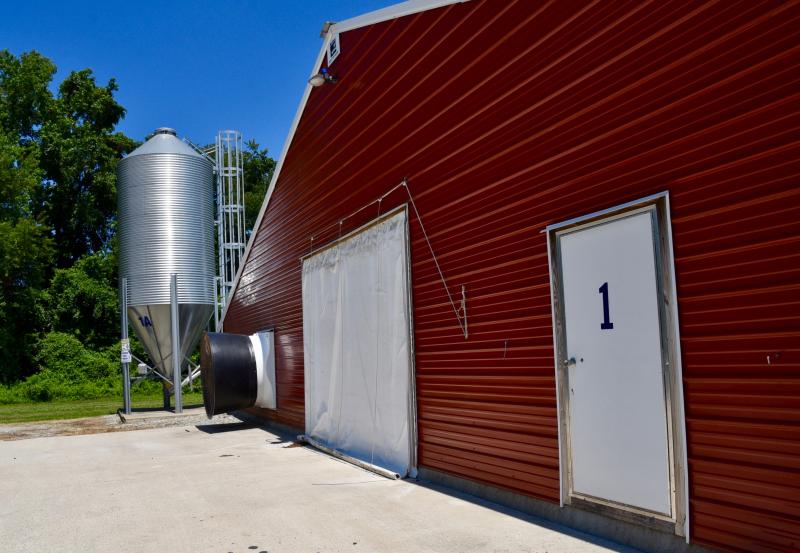Only a few years ago, operating a chicken house by phone would have been science fiction for poultry growers.
Today's growers rely on controller systems to monitor watering and feeding their chickens. heating and cooling their houses, and even lighting – with backup systems in place as well.
Technology has overtaken the industry and the growing operation. In addition, poultry farmers are inundated with research data from the Delmarva Poultry Industry, University of Delaware and other universities.
Even with technology, growers must maintain the same vigilence they have since the industry began to ensure their success.
Robert and Lise Masten of Milford have two houses in a rural area east of Route 1 near Milford. It's Lise, a second-generation poultry farmer, who is at the houses early each morning, since Robert works full time as a Milford police officer. They've been growing chickens since 2012, and have embraced the latest technology.
The operation of the houses is mechanized, but they still have to check on their chickens daily, and they have to stay close to home while flocks are growing.
“People have no idea how important the poultry industry is to Delmarva and Sussex County in particular,” Robert said. “It's the backbone in Sussex County for people making a living.”
Because of technology, one or two people can now manage a large-scale poultry operation, said DPI Director Holly Porter. She said today's farmers are more efficient and more aware of the environment.
Technology and research have led to the healthiest chickens ever, she said.
Porter said key innovations over the years include nipple drinkers, which cut down on the amount of wastewater spilled on litter, keeping it drier and reducing odors; tunnel ventilation systems and cool-cell pads, which circulate air, keeping chickens cooler; and controller systems that operate and monitor all systems in a house.
Five flocks a year
In their 60-by-560-foot houses, the Mastens grow more than 89,000 chickens in the Allen Harim small-bird program. They typically grow five flocks a year of 5 ½-pound chickens in about 38 days with about two weeks between flocks. During that downtime, houses are cleaned out.
While the Mastens are under contract with Allen Harim, they had to finance their two houses with a 15-year loan from Mid-Atlantic Farm Credit. Today's houses can cost as much as $200,000, not including the cost of land.
Industry-wide, a grower's gross income from a house ranges from $28,000 to $35,000 a year per house.
In Sussex, keeping chickens cool during summer is key to financial success. On the Masten farm, water pumped through an air-cooling system combined with a system of 14 computer-controlled fans keeps the temperature at least 10 degrees cooler than the temperature outside a house. Then in the winter, heaters with individual thermostats and fans circulate air to keep the houses warm.
An Allen Harim company service technician checks on the chickens and makes the final decision when it's time for them to be transported to the Harbeson processing plant.
In Sussex County, a few birds from every flock are tested for healthiness and disease prevention by scientists at Lasher Laboratory near Georgetown before a flock is transported to a processing plant. All flocks throughout Delmarva are also tested.
Biosecurity is paramount
The Mastens, like all other poultry farmers, take biosecurity seriously. No one without protective clothing is permitted to enter their houses.
Farmers are encouraged to minimize any contact with other farmers' flocks, keep other animals away from their flocks and maintain pest control around their houses.
Biosecurity measures have been in place for years to prevent the introduction and spread of diseases such as avian influenza.
James Fisher, DPI's public relations manager, said Delmarva farmers are 10 years ahead on biosecurity and environmental measures compared to most growers in the rest of the nation. “They come here and say show me,” he said.
Environmental awareness
The Mastens have won an environmental award for steps they have taken on their farm, such as maintaining a wide tree buffer from neighboring properties, a state-of-the-art retention pond system and concrete pads outside the doors of their houses to keep chicken manure from getting on the ground.
Porter said in the past few decades, the industry has encouraged better handling of poultry litter, the end product when chickens are removed from houses.
“Litter has a value. It's not waste” Porter said. Farmers sell manure for $15 to $20 a ton to spread on farm fields as fertilizer.
Fisher said farming in proximity to Chesapeake Bay and the Inland Bays has pushed the industry forward to better stewardship.
He said water quality is improving with fewer nutrients flowing to the bays due to voluntary and mandatory agricultural practices. “Farmers are helping the bay. There is zero doubt about that,” he said.
DPI's roots in Chicken Festival
Delmarva Poultry Industry, headquartered in Georgetown, has its roots in the Delmarva Chicken Festival. In 1948, a chicken cooking contest was started by A&P markets in the area, and DPI was formed to administer the contest. The festival rotated to different Delmarva towns for 65 years before ending in 2014. Festivals included parades, queen contests, midway rides and games, entertainment and lots of chicken cooked in a signature, 10-foot frying pan.
DPI is now the voice of the industry on Delmarva. Go to dpichicken.org for more information.
A $1.7 billion Delaware industry
700 poultry farms
200 million chickens a year
70 percent of farm income comes from chickens
Nearly all corn and soybeans grown in the state are used to make chicken feed
On Delmarva
1,500 growers
560 million chickens
3.6 trillion pounds
Delmarva includes all three Delaware counties, nine Maryland counties and Accomack County, Va.
DELMARVA COMPANIES
(with national rank by chicken production)
Tyson; 4. Perdue; 6. Mountaire; 12. Amick*; 20. Allen Harim
Four poultry processing plants in Sussex County employ about 10,000 workers
* Marketed under different company names
Source: Delmarva Poultry Industry































































